You are viewing an older revision! See the latest version
IC Sensor and Driver Breakout Boards
Most new ICs, sensors, and drivers are only available in the newer small surface mount IC packages (SMT), and not in the older and larger DIP style IC package pins that plug directly into a solderless breadboard. In addition, many small electronic modules such as GPS, RFID, and RF modules may not have pins on .1 inch centers that will fit a breadboard. A wide variety of commercial breakout boards are available that have the device mounted on a small printed circuit board that has .1 inch spaced pins that will plug directly into a breadboard as seen below. Typically, .1 inch header pins must be purchased separately and soldered to the holes provided in the breakout board. Breakout boards can save a lot of time when making a rapid prototype. Many of the more common breakout boards already have libraries and code examples posted in the cookbook.

A Compass SMT IC Breakout board from Sparkfun.
Commercial IC Breakout Boards¶
Breakout boards are available from a variety of vendors such as www.Sparkfun.com and www.Pololu.com. Sparkfun has the largest selection of breakout boards, and Pololu has many Sparkfun boards plus a nice assortment of motor driver breakout boards. In addition to direct sales, Sparkfun's resellers and Pololu's resellers offer a large number of distributors worldwide such as http://www.SKPang.co.uk, http://Coolcomponents.co.uk, and http://www.active-robots.com in the UK.
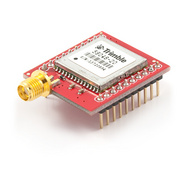
A GPS receiver mounted on a breakout board from Sparkfun
Often, the breakout board will also include the other small parts required to use the device as seen in the MOSFET DC motor driver breakout below. The screw terminals are used to attach larger and higher current wires needed for the motor.
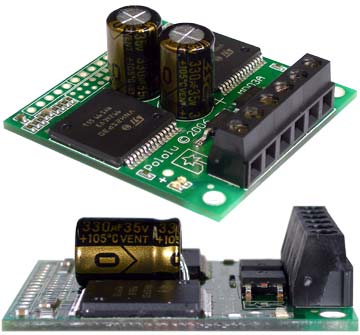
A Dual DC Motor Driver Breakout Board from Pololu.
Phidgets also makes a somewhat different assortment of 3.3V to 5V analog sensors (IR and Sonar distance, force, pressure, temp, touch, humidity, motion, current, PH, load cells, rotation and more) mounted on small printed circuit boards with a .1 inch 3 pin cable connector (just like an R/C Servo cable) that can be easily attached to a breadboard. With the sensor on a cable, it can be mounted other places than a breadboard when needed. More information on using Phidgets for mbed projects can be found at http://mbed.org/forum/news-announcements/topic/1023/. Phidgets also has a number of resellers worldwide. In the UK, Phidgets are available through Active Robots.
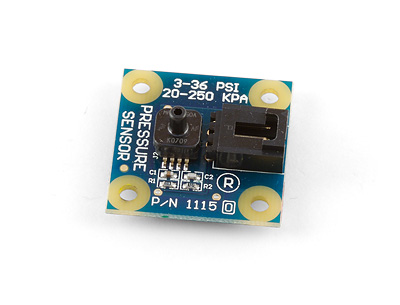
A Phidgets Analog Sensor Board is easy to use with a breadboard.
Custom IC Breakout Boards¶
For projects using new or unusual ICs in low-pin count surface mount devices that are not already available on a commercial breakout board, small low-cost SMT to DIP adapter boards are available with pins that plug into a standard .1 inch breadboard. Adapters such as the one seen below, are also available for many of the more common surface mount package styles from places such as www.sparkfun.com.
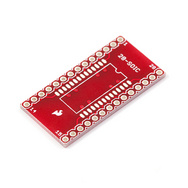
A Sparkfun SOIC to DIP Adapter Board
An even wider assortment of adapters can be found at http://www.proto-advantage.com, http://www.winslowadaptics.com, http://www.schmartboard.com and http://www.beldynsys.com. The surface mount device must be carefully soldered to the adapter board by the user. Proto Advantage will even solder the chip to the adapter, if you want to avoid surface mount soldering.
One surface mount adapter used in a recent student project is seen below. It has an Analog Devices 16-bit A/D SMT chip with an SPI interface soldered on it, and the DIP header pins sticking out on the back side allow it to plug directly into a student breadboard. There are also a number of DIP adapter boards with sockets for devices such as ICs in PLCC or SOIC packages. As a final option, a custom PCB design can be made. See http://mbed.org/forum/news-announcements/topic/1029/ for some basic getting started information on custom PCBs.
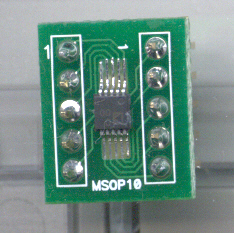
A SMT to DIP adapter board for use on a breadboard.
If all else fails, you might be able to mount things on a .1 inch perforated protoboard and solder wires to header pins as seen in Simon Ford's GPS cookbook project below.
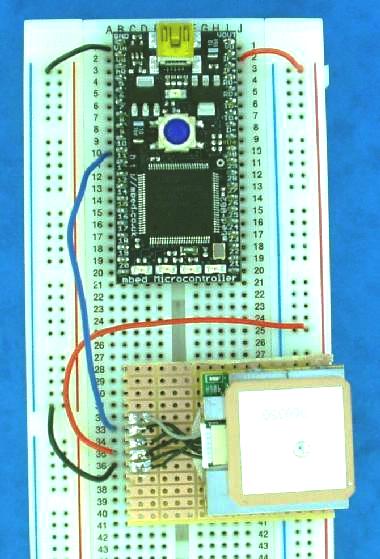
GPS module mounted on a perfboard and then plugged into breadboard